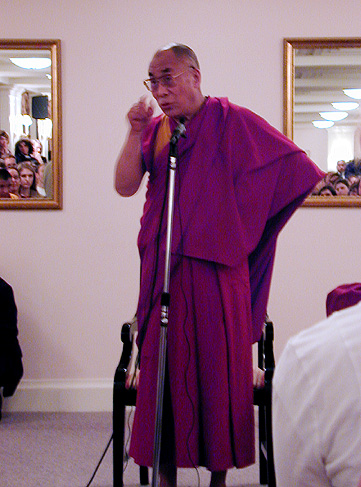
International Campaign for Tibet October 1, 2003
Former British Prime Minister and now a member of the House of Lord, Margaret Thatcher, has said that China's claim over Tibet is dubious on historical grounds. Saying that a "systematic extinction of a nation and its culture is unpardonable" she called upon the international community to speak out on Tibet.
Thatcher's reference to Tibet is contained in her latest book, Statecraft, Strategies for a Changing World, published in paperback edition in the United States this year. Discussing China Thatcher details three groups that, she says, are anathema to the Chinese leadership. They are the non-Chinese people, Chinese women & babies, and members of 'unauthorised' religions.
Tibet is talked about in the non-Chinese people category. Thatcher says Tibet became a Chinese protectorate in the 17th and 18th centuries but that in the 19th century Chinese authority was "virtually symbolic." She says between 1912-1951 Tibet functioned as an independent state.
The former British prime minister says China is bent upon resolving the Tibetan problem through changing the ethnic balance in favor of ethnic Chinese. She hopes that China does not succeed in this.
The reference to Tibet is contained on pages 172-173 of the Perennial paperback edition and says the following.
"The second group which suffers harshly from Chinese communist rule are the non-Chinese minorities. Unlike the Soviet Union, and indeed unlike today's Russian Federation, China is remarkably homogeneous. Ninety-three per cent are Han (ethnic) Chinese, but the 7 per cent minority population occupies 60 per cent of China's territory, which means it is of disproportionate strategic significance.
"That is especially the case with Tibet. The Chinese claim to Tibet is dubious on historical grounds. In the late seventeenth and eighteenth centuries Tibet became a Chinese protectorate. However, in the nineteenth century Beijing's control weakened until it was virtually symbolic. Between the overthrow of the Empire in 1912 and the Chinese communist invasion of 1950-51, Tibet functioned as an independent state.
"Yet the fact remains that no modern Chinese government is going to allow Tibet full independence, and the present Chinese leadership is unwilling even to negotiate with the Tibets' spiritual and temporal leader, the Dalai Lama, on any real autonomy. It is not just that the Chinese have convinced themselves that Tibet is part of historic China. Equally important is the fact that it is one of the principal locations of their nuclear weapons and missile arsenal. The Chinese now appear to have resolved upon a programme of 'modernisation' that involves shifting the ethnic balance in favour of Han Chinese and away from Tibetans, as a final solution to the continuing resistance. I hope that they do not succeed. Some 2700 Tibetan monasteries have already been destroyed since the communists marched in fifty years ago. The systematic extinction of a nation and its culture is unpardonable. But, the fact is that the West has no fundamental security interests in Tibet. This limits what we can do -- though not, of course, what we should say in every international forum."
In two other public speeches on Economic and Political Challenges of the 21st Century in Jakarta in November 15, 1995 and in Islamabad on March 23, 1996 Thatcher talked about the rise of China as a major power and referred to China having "occupied" Tibet. In the Jakarta speech, Thatcher said, "While China has always been vigilant about its borders and has occupied Tibet, it has not historically been an expansionist power with territorial designs on its neighbours." In the Islamabad speech, she said, "We should always view with the greatest suspicion a country which so readily uses its power to menace others. China has occupied Tibet, will soon recover Hong Kong and Macao, has fought border wars with India and Vietnam, and her recent use of missiles in the Straits of Taiwan is a shocking portent."
Born in October 1925 at Grantham, a small market town in eastern England, Thatcher won three successive General Elections and served as British Prime Minister for more than eleven years (1979-90). In the years following her resignation as Prime Minister Margaret Thatcher busied herself with worldwide lecture tours and writing two volumes of memoirs: The Downing Street Years and The Path to Power. In 1991 she announced she would stand down as a Member of Parliament at the next General Election.
She was elevated to the Peerage in 1992 and took her seat in the House of Lords as Baroness Thatcher of Kesteven. She has remained active in political life and continues to lecture widely on behalf of the Thatcher Foundation. The Margaret Thatcher Foundation was formed in 1991 to advance the cause of political and economic freedom.